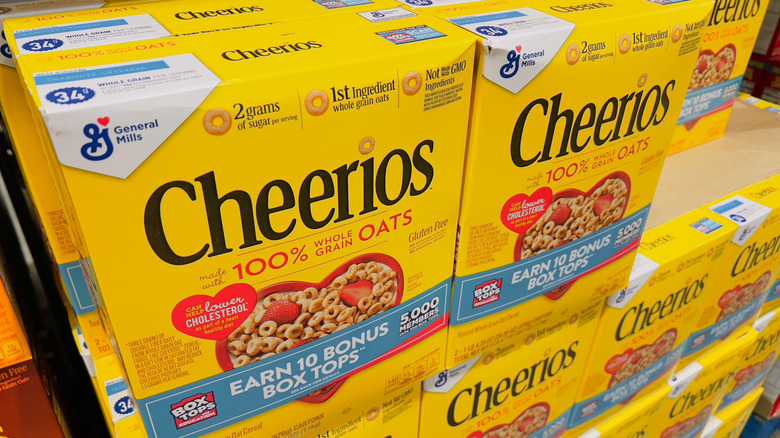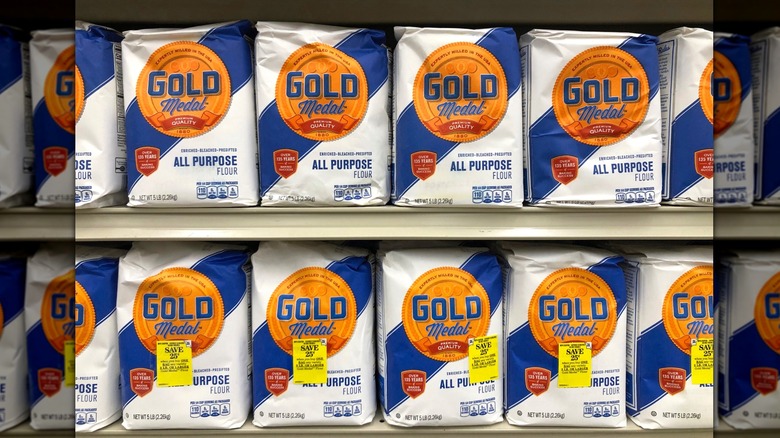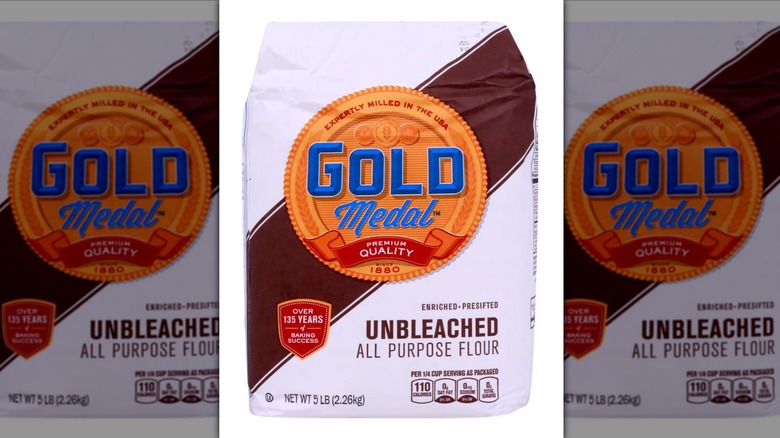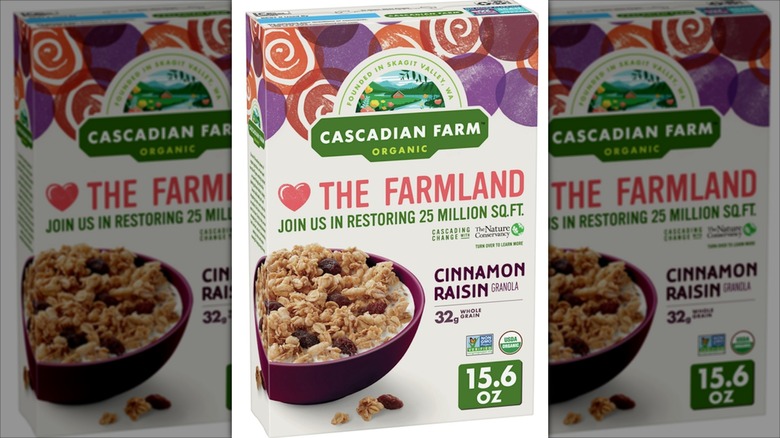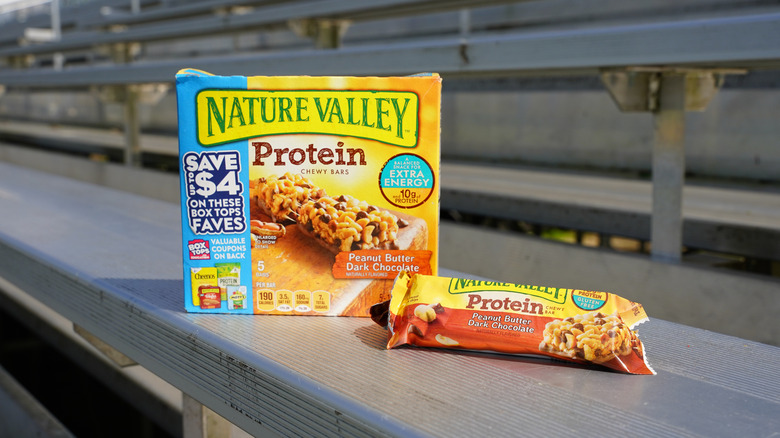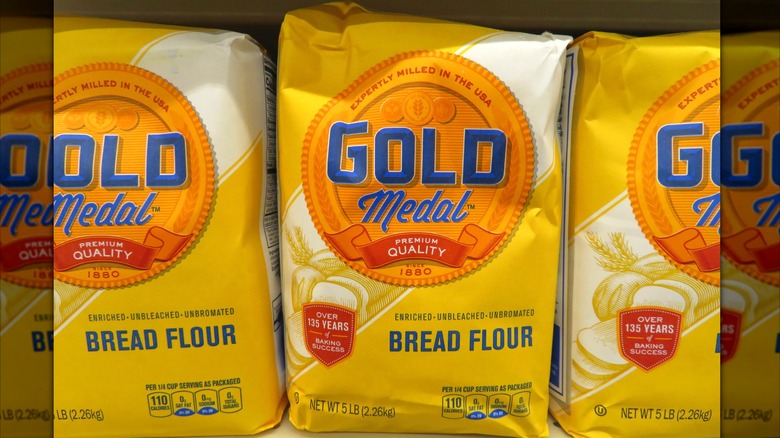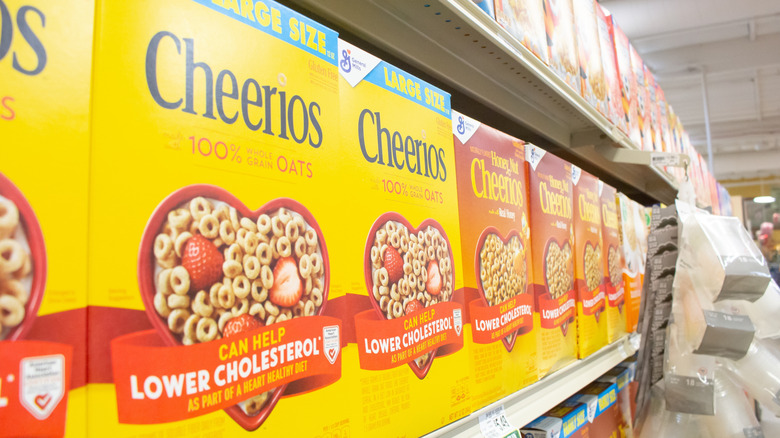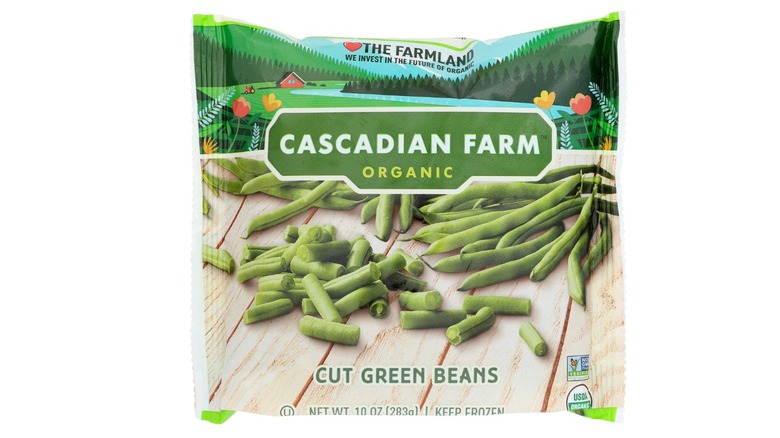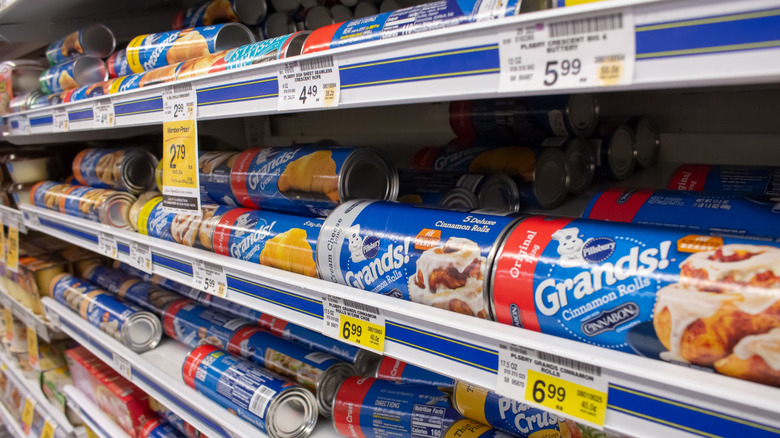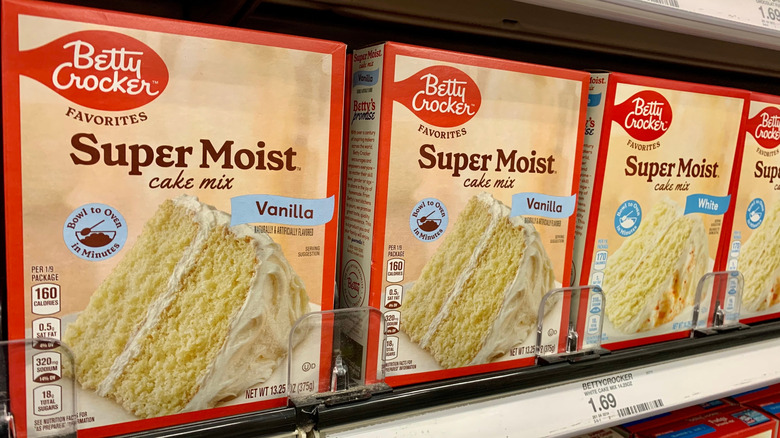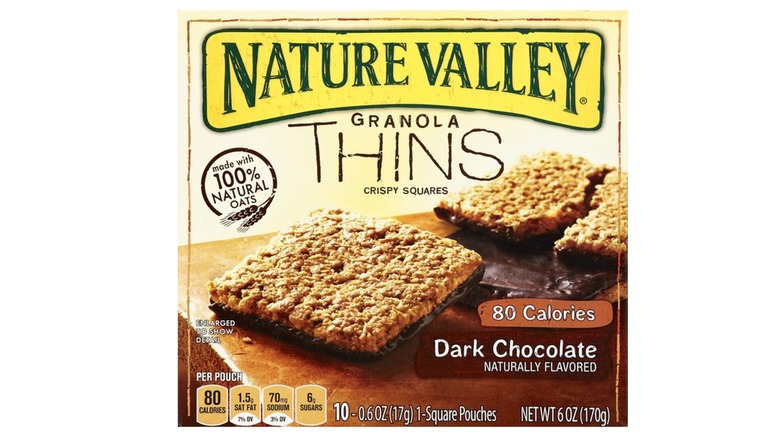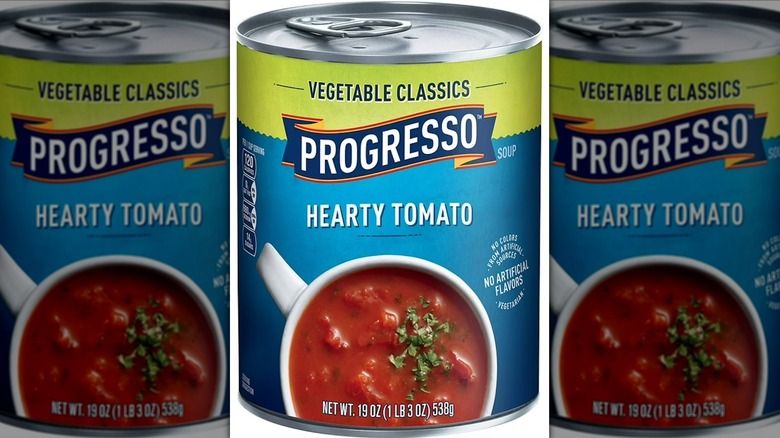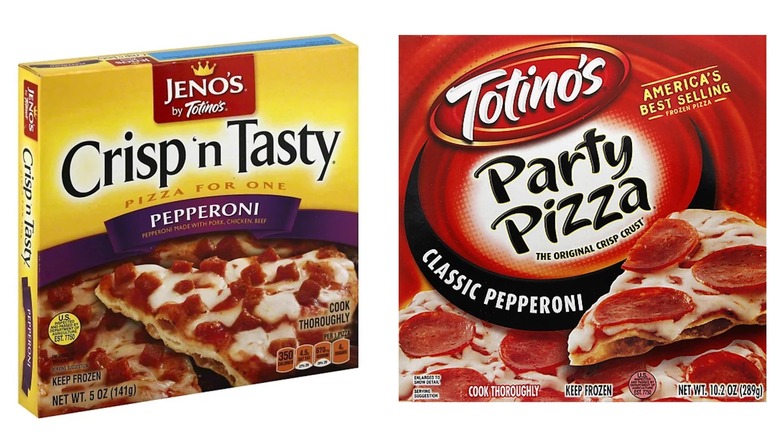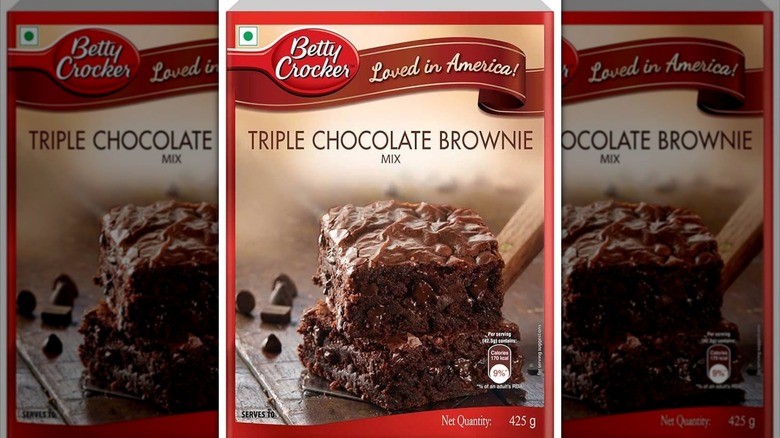General Mills Recalls That Affected Millions
General Mills started out as a single flour mill and grew into one of the world's largest corporations. Today, the company oversees more than 100 brands, including Cascadian Farm, Nature Valley, and Betty Crocker. The sheer amount of food this corporation produces is impressive, and you've likely enjoyed several of its products, from Cheerios to Chex Mix. However, with such high output comes increased risk, and General Mills has experienced numerous food recalls throughout the years.
Food recalls have been on the rise and can happen for various reasons including packing errors or undisclosed ingredients. When this occurs, consumers might open a package to discover the item is a different flavor or product altogether. Worse yet, these shoppers may be blind to potential allergens. In more serious cases, food recalls occur when dangerous pathogens like E. coli, salmonella, and listeria are detected through routine testing, or when an outbreak is traced to its source.
Some of General Mills' recalls have cost thousands or even millions of pounds of product, resulting in substantial revenue loss. Damage control may involve press releases, removing products from store shelves, and compensating consumers who have experienced anything from minor disappointment to serious foodborne illness. It's safe to say when General Mills issues a recall, the consequences can be far-reaching — which will become even more apparent as we explore the company's biggest food recalls.
Millions of pounds of Gold Medal flour recalled for salmonella (2023)
General Mills is best known for its first-ever product, flour. The company's flour has been top-notch since the get-go, earning medals for quality as far back as 1880. As such, it's no coincidence that one of the brand's signature flours was named Gold Medal. But while this product has won awards, it's also the source of one of General Mills' biggest food recalls of all time.
When a finished batch of Gold Medal All Purpose Flour was tested in 2023, employees detected salmonella in the 2-, 5-, and 10-pound bags. The incident was deemed a Class I recall, meaning there is a reasonable chance that it will cause adverse health consequences or even death. For reference, the FDA classifies recalls into three designations (I, II, and III), in which class I has a high chance and class III has a low chance of serious health concerns. Following the discovery, General Mills issued a voluntary recall for Gold Medal bleached and unbleached flour products with two "better if used by" dates.
Mind you, salmonella is killed when raw flour is properly cooked or baked. However, flour is a toxic food if cooked incorrectly. If people were to consume this particular batch of flour undercooked, it could lead to salmonella poisoning. So ultimately, the company did the right thing, even if it cost over 2,000,000 pounds of product.
Gold Medal flour recalled for pathogen risk twice in one year (2019)
2019 was a rough year for Gold Medal flour. But at least General Mills conducts proper testing on its supplies because, within one year, the flour tested positive for both E. coli and salmonella. General Mills announced the first recall in January 2019 when the company's in-house testing was positive for salmonella. The silver lining? The only affected product was the 5-pound bags of Gold Medal Unbleached Flour with a "better if used by" date of April 20, 2020.
Jim Murphy, President of General Mills meals and baking division, explained that the company would rather be safe than sorry. "Food safety is our top priority, and though we have not had any confirmed illnesses, we are voluntarily recalling the specific lot of Gold Medal unbleached flour to prevent potential illnesses," (per FDA). Unfortunately, despite the recall only affecting one date code, the Food Industry Counsel reported a loss of over 400,000 pounds of flour.
The second food recall of the year came in September and also impacted the 5-pound bags of Gold Medal Unbleached All Purpose Flour. Samples of the product showed potential contamination with E. coli. According to the FDA, not all strains of this bacteria are harmful, but the particular strain in question, E. coli O26, is potentially deadly. Again, the company only needed to recall one day's worth of production. But according to the Food Industry Counsel, that amounted to a whopping 639,560 pounds.
Cascadian Farm cereal recalled for undisclosed almonds (2017)
Cascadian Farm is known for its healthy line of cereals, granola bars, and produce. The company prides itself on carrying organic products, including its Cinnamon Raisin Granola. This tasty breakfast option is made with oats, rice, raisins, and cinnamon — but you won't find nuts anywhere on the label. In fact, the ingredients list even states that it doesn't contain any declarable allergens. So when some potential almonds snuck into a few batches, it caused quite the stir.
Cascadian Farm Cinnamon Raisin Granola produced on July 15 and 16, 2017 was recalled for undeclared almonds. It was subsequently pulled from store shelves and warehouses. How these almonds entered the granola supply is unclear. Perhaps it was cross-contamination from another product or an assembly-line mistake. We're also uncertain how the almonds were discovered in the granola. However, we do know that the Food Industry Counsel reported a 40,000-pound product loss.
The FDA requires companies to identify any major sources of allergens on food labels, including almonds. Failing to identify almonds on the label presents a major health risk. In the wrong hands — or mouths — it could induce a severe reaction like anaphylaxis. Luckily, we couldn't find reports of any illnesses, so the only major losses were likely financial.
Multiple Nature Valley bars impacted by massive sunflower seed recall (2016)
Oftentimes, recalls aren't a matter of how a company manufactures or packages a product, but where it sources its ingredients. And in 2016, Nature Valley learned this lesson firsthand. Nature Valley is known for its granola bars, which are made with several natural ingredients, like whole grains, nuts, and seeds. In recent years, Nature Valley has debuted several savory granola flavors as well.
To source ingredients for all these products, the brand turns to many manufacturers including SunOpta. Unfortunately, this sunflower seed company reported a potential listeria risk in May 2016. According to the Food Industry Counsel, the recall impacted over 8,000,000 pounds of sunflower seeds, which inevitably had a trickle-down effect, leading to a recall of six Nature Valley products.
Nature Valley voluntarily recalled two Protein Chewy Bars and four Simple Nut Bar products. However, by the time the recall was announced, these products had left distribution centers and were already in stores or consumers' pantries. When this happens, General Mills offers a product replacement to anyone affected by the recall. If consumers don't hear the news, there's obviously a chance of them falling ill. Luckily, we couldn't find reports of confirmed listeria cases directly related to Nature Valley.
E. coli outbreak led to massive General Mills flour and baked goods recall (2015-2016)
With many recalls, a suspected pathogen is caught in time. This means it's discovered before it hits too many store shelves and consumer stomachs, avoiding a potential disaster. Sadly, that was not the case with this Gold Medal recall.
According to the CDC, a multi-state outbreak of shiga toxin-producing E. coli led to an extensive investigation. Not all E. coli bacteria cause a reaction, but the shiga-toxin-forming strand is known for severe outbreaks of the disease. It can cause intestinal bleeding, leading to blood clots and kidney damage. The CDC and other health officials interviewed victims and used trace-back evidence to pinpoint a likely source: General Mills flour. As a result, the company issued a recall of several brands of all-purpose flour and cake mixes in May 2016.
Unfortunately, the E. coli had affected a far larger batch of flour than they had initially expected. In July of the same year, General Mills expanded the recall twice to include more production dates. And as of September 2016, the CDC reported 63 infections across 24 states, with 17 people requiring hospitalization. However, because the flour was not caught in time, there may have been more unreported cases.
Original Cheerios and Honey Nut Cheerios recalled for an undeclared wheat allergen (2015)
Did you know several Cheerios varieties are naturally gluten-free? Although the brand's original Cheerios and Honey Nut Cheerios are advertised as being made with whole grains, those grains only include oats or corn. Assuming they're sourced correctly, these ingredients are safe for those with wheat intolerance or sensitivity. But if you're a gluten-free consumer and Cheerios are your go-to morning cereal, you may have experienced tummy trouble circa 2015.
A production facility in Lodi, California, accidentally introduced wheat flour into the brand's original Cheerios and Honey Nut Cheerios. The incident took place in July of 2015 but wasn't discovered for a couple of months. As such, General Mills was forced to recall Honey Nut Cheerios with 13 different "better if used by" dates and original Cheerios with four different dates. We're unsure of the exact quantity of boxes tossed, but with such a high number of dates affected, we'd assume it cost the company a pretty penny.
Cascadian Farm green beans recalled twice for listeria (2015)
It's safe to say it wasn't a great year for Cascadian Farm, since the company recalled frozen green beans not once — but twice — within the span of a few months. The first time came in August when the company discovered one of its 10-ounce packages tested positive for listeria. The bag was produced in 2014 and forced a recall of two 2016 "better if used by" dates. The second occurrence came in October when the 16-ounce frozen green bean bags were also recalled for listeria. This time, the bags were produced in June 2015 and had a "better if used by" date of June 2017.
According to Food Safety News, each recall caused a loss of 60,000 bags, totaling a whopping 120,000 — but for good reason. Listeria isn't something you want to mess with. The FDA warns that listeria can survive preservation methods, and when people consume food contaminated with the bacteria, they may develop listeriosis. A mild case is reminiscent of your standard food poisoning, but more severe cases can show up weeks or even months later and cause funky symptoms like a stiff neck and confusion, and potentially death in immune-compromised individuals.
Pillsbury Cinnamon Rolls contaminated with plastic bits (2013)
We've all heard crazy rumors of people finding foreign objects in their food, with everything from rats to razors being reported. Whether these stories have merit or are merely myths is up for debate. However, foreign objects do enter the food supply from time to time but are usually far less intimidating. In 2013, Pillsbury Cinnamon Rolls were recalled for this very reason.
In September 2013, Pillsbury recalled its 8-count and double packages of Cinnamon Rolls with Icing because the dough may have been contaminated with plastic pieces. We're unsure how the plastic found its way into the batter or how it was discovered. While research is increasingly demonstrating that people consume plastic from a variety of sources, sizeable pieces in food products is concerning.
So ... is consuming plastic something we should be worried about? Most microplastics in food are so small you wouldn't notice them, so they are unlikely to make you choke. However, they can release harmful chemicals as they work their way through the digestive tract. So while it's important to be mindful of what you consume, plastic in Pillsbury products doesn't seem to be a common occurrence.
Betty Crocker cake mixes contained undeclared food dyes (2012)
One of General Mills' many companies includes Betty Crocker, the famous cake mix brand. Its Super Moist Cake Mix is a popular and reliable product for all occasions. Mind you, the company does provide bad advice on cake mix, encouraging consumers to use vegetable oil rather than creamier butter. However, that's only a minor issue compared to a 2012 fiasco involving some undeclared food dyes.
The Food Industry Counsel reported that over 70,000 pounds of Betty Crocker's Vanilla Super Moist Cake Mix were recalled because the label failed to declare several food dyes including Blue #1, Red #40, Yellow #5, and Yellow #6. The standard ingredients label doesn't list these dyes, leading us to believe they weren't meant to enter the cake boxes to begin with. Beyond that, vanilla cake is a light cream color. We're not sure where red or blue fit into the mix — but it would be a colorful surprise for those expecting a classic vanilla.
We can only speculate what happened during production ... whether cake mixes were packaged incorrectly, dyes were misplaced, or otherwise. However, we understand the necessity of labeling food dyes. According to the International Journal of Occupational and Environmental Health, consuming artificial food coloring can cause a wide range of negative health effects. Some have been shown to be contaminated with carcinogens while others are genotoxic or cause hypersensitivity reactions.
Nature Valley's Dark Chocolate Granola Thins mislabeled (2010)
Snackers reaching for Nature Valley's Dark Chocolate Granola Thins in 2010 may have been sorely disappointed to discover a different flavor in the box. If they bit into a bar, they'd taste the brand's Peanut Butter Granola Thins instead. Not only was this not the flavor they bargained for, but it posed a serious health risk, which is why over 6,000 pounds of product were recalled.
The American College of Asthma, Allergy, and Immunology reports that nearly 2.5% of kids might be allergic to peanuts and that number only seems to be increasing. Symptoms can range from stomach cramps to hives. Worst case scenario, a peanut allergy can cause full-blown anaphylaxis, which can be life-threatening without immediate intervention. As such, peanuts are often banned on school grounds.
With this knowledge, it makes complete sense that Nature Valley voluntarily recalled the granola thin boxes. The Dark Chocolate Granola Thins aren't made with peanuts, despite having the frequently-seen "may contain peanuts" warning at the end of the ingredient list. However, without clearly claiming peanuts as an ingredient, consumers could be at risk of potential allergic reactions.
Progresso mislabeled over 200,000 soup cans (2008)
There are so many underrated canned soups you should try, from Progresso's Vegetable Garden to its Loaded Potato with Bacon. However, if you opened up one of these cans to discover an entirely different flavor, you'd be surprised — and might have to pivot those dinner plans. Unfortunately, it happens occasionally, and Progresso experienced this the hard way.
The FDA reported that on October 31, 2008, Progresso recalled over 270,000 cans of Hearty Tomato soup due to a catastrophic labeling mistake: The Hearty Tomato sticker had been placed over cans of Light Vegetable and Noodle Soup. It may have been Halloween, but this was no intentional trick — and we also wouldn't consider it a treat either. The Hearty Tomato is a vegan-friendly soup that doesn't have any declared allergens. Meanwhile, the Light Vegetable and Noodle Soup contains chicken, wheat, milk, and egg products. With the sheer amount of food restrictions nowadays, it's easy to understand the problems that could arise from such a labeling mistake. Plus, a can of veggie noodle soup wouldn't pair nearly as well with that grilled cheese.
E. coli illnesses pointed to two General Mill frozen pizza brands (2007)
What's the worst-case scenario with a food recall? That it happens too late to avoid widespread illness. After all, it's one thing for companies to discover a pathogen in a product and promptly remove it from circulation. It's another to observe widespread bacterial infections and trace them back to a source. Unfortunately, this is precisely what happened when a 2007 E. coli outbreak pointed at two General Mills frozen pizza brands.
The CDC reported a multi-state outbreak of E. coli, leading to an investigation. The results showed that affected individuals were reported in 10 states, with eight of them hospitalized, and four of them experiencing kidney failure. Evidence pointed to two brands of pepperoni pizza: Totino's and Jeno's. Both of these brands belong to the General Mills family, prompting the company to make a major recall. Whether it was the dough, cheese, or pepperoni is up for debate, but it wouldn't be the first time ready-to-eat meat was the source of food recalls.
According to the Food Industry Counsel, General Mills recalled frozen pizza from both brands in November 2007, amounting to over three million pounds of pizza. However, seeing how the pizzas were already in circulation, chances are not everyone got the memo. Hopefully, any extra E. coli victims recovered swiftly and returned to their pizza-eating ways.
Chocolate brownie mix-up led to huge recall (2003)
Would you rather buy turtle brownies or triple chocolate? Well, if you opened a box of Betty Crocker's Triple Chocolate Brownie Mix in 2003, it may have been a toss-up anyway. The famous cake mix company accidentally placed its Turtle Brownie mix into the Triple Chocolate Brownie boxes. The mix-up might not sound like a big deal, especially considering they're both brownies. However, Turtle Chocolate contains pecans and Triple Chocolate doesn't. As a result, those Triple Chocolate boxes contained an undeclared allergen.
According to the American Academy of Allergy, Asthma, and Immunology, pecans are part of the tree nut family, which is one of the nine most common allergens in the United States. You don't often hear about pecan-specific allergies, however, the AAAAI explains that many people are allergic to multiple types of nuts, especially ones that are closely related, like walnuts and pecans. As such, the company recalled over 150,000 pounds of brownie mix.
